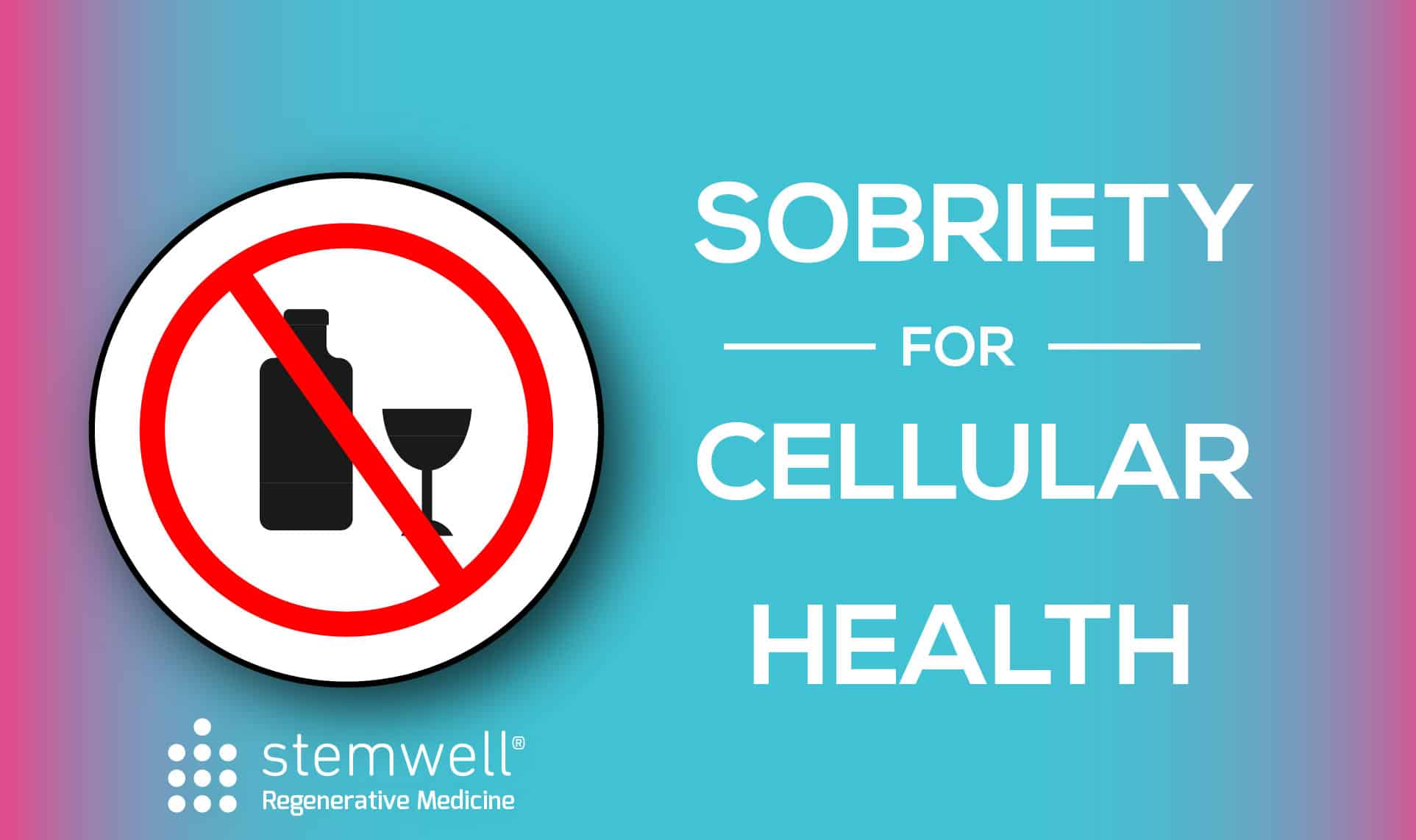Abstaining from alcohol, even for a short period, can have profound effects on the body’s ability to heal and regenerate. From the skin we see in the mirror to the intricate workings of our liver, immune system, and even our DNA, alcohol’s far-reaching effects can impact health, longevity, and overall quality of life.
At Stemwell Health, we focus on harnessing the body’s natural ability to regenerate through advanced stem cell therapies. But sometimes, the most impactful regenerative tool is as simple as taking a break from alcohol. In this blog, we’ll explore the powerful ways that alcohol abstinence can promote cellular healing and rejuvenation, setting the stage for long-term health.
Cellular Regeneration: The Key to Renewed Health
Every single day, our bodies regenerate and repair themselves at a cellular level. This process, known as cellular regeneration, is essential for maintaining optimal health. However, factors like alcohol consumption can severely hinder the body’s ability to regenerate effectively. Chronic alcohol use damages cells, tissues, and organs, leading to inflammation, oxidative stress, and long-term harm.
When you take the step to stop drinking— whether for a few weeks, months, or longer—your body has the opportunity to begin the healing process. Alcohol abstinence can drastically reduce the strain on your cells, allowing them to focus on repair and regeneration. Whether it’s your liver, skin, or brain, every part of your body benefits from a break from alcohol.

The Cellular Cost of Alcohol
Alcohol consumption can hinder the body’s ability to repair and regenerate cells in several ways:
- Oxidative Stress and DNA Damage: Alcohol metabolism generates reactive oxygen species (ROS), leading to oxidative stress and potential DNA damage. This stress can disrupt normal cell cycles and impair the body’s repair mechanisms. Over time, this accumulation can increase the risk of mutations and chronic diseases.
- Inflammation and Stem Cell Dysfunction: Chronic alcohol intake promotes systemic inflammation, adversely affecting stem cell activity. Since stem cells are vital for tissue regeneration, their dysfunction can slow healing and reduce the body’s regenerative capacity.
- Impaired Nutrient Absorption: Alcohol interferes with the absorption of essential nutrients, such as vitamins (A, C, D, E) and minerals (zinc, magnesium), which are critical for cellular repair and regeneration. Deficiencies in these nutrients can exacerbate tissue damage and impair recovery from injuries or illnesses.
- Liver Regeneration Challenges: The liver, known for its remarkable regenerative abilities, is particularly vulnerable to alcohol’s effects. Prolonged alcohol use can lead to fatty liver, hepatitis, and cirrhosis, severely impairing the liver’s regenerative capacity and compromising detoxification.
- Weakened Immune System: Chronic alcohol consumption impacts immune cells, especially monocytes and macrophages, leading to a state of hyperinflammation. This means the body produces excessive inflammatory signals while the immune cells become less effective. Alcohol causes this imbalance through oxidative stress and changes in gene expression in immune cells, increasing susceptibility to infections and impairing wound healing.
The Regenerative Power of Sobriety
Even a short break from alcohol can have transformative effects on cellular health:
- Reduction in Inflammation: Abstinence lowers systemic inflammation, allowing stem cells to function more effectively, supporting tissue repair and rejuvenation, particularly in vital organs like the liver and heart.
Improved DNA Repair: With reduced oxidative stress, the body’s natural DNA repair mechanisms operate more efficiently, preventing long-term cellular damage and promoting healthier aging. - Enhanced Nutrient Uptake: Without alcohol interfering, the body can absorb nutrients more effectively, supporting cellular regeneration and overall health—especially beneficial for those undergoing stem cell therapies.
- Liver Healing: The liver begins to repair itself almost immediately after alcohol cessation. Fat deposits decrease, liver enzymes stabilize, and new healthy liver cells regenerate, improving detoxification and systemic health.
- Immune System Recovery: Reduced oxidative stress enables immune cells to restore optimal functionality, enhancing immune response to infections and accelerating tissue repair.
Reducing or eliminating alcohol consumption not only restores the body’s ability to repair and regenerate cells but also enhances overall cellular health. It significantly lowers the risk of developing conditions such as diabetes, weight gain, and cancers—including stomach, esophageal, bowel, breast, throat, mouth, and liver cancers. Furthermore, it reduces the likelihood of stroke, dementia, and heart attacks while improving physical health and enhancing sexual performance.
Reducing or eliminating alcohol consumption not only restores the body’s ability to repair and regenerate cells but also enhances overall cellular health. It significantly lowers the risk of developing conditions such as diabetes, weight gain, and cancers—including stomach, esophageal, bowel, breast, throat, mouth, and liver cancers. Furthermore, it reduces the likelihood of stroke, dementia, and heart attacks while improving physical health and enhancing sexual performance.
Long-Term Benefits of Mindful Drinking
While taking a temporary break from alcohol provides a concentrated period of detoxification, adopting a mindful approach to alcohol consumption throughout the year can amplify these benefits. Studies suggest that moderate alcohol consumption has far less impact on cellular health than chronic heavy drinking. Combining reduced alcohol intake with a nutrient-rich diet, regular exercise, and adequate sleep can significantly improve the body’s ability to heal and regenerate.
At Stemwell Health, we emphasize lifestyle choices that support regenerative health. For patients exploring stem cell therapies, abstaining from alcohol—temporarily or permanently—can create an environment conducive to optimal outcomes.
Conclusion
By taking control of your alcohol consumption, you take control of your health. Every moment without alcohol is an opportunity for your body to repair, regenerate, and thrive. Whether you’re looking to optimize your well-being or enhance the outcomes of stem cell therapy, embracing mindful drinking is a powerful step toward a healthier, more resilient future.
Apply today to check your eligibility and take the first step toward improved well-being with stem cell therapy.
Frequently asked questions
Alcohol increases inflammation and oxidative stress, which directly disrupt stem cell function. Stem cells are crucial for tissue regeneration, and their ability to repair and regenerate tissues is impaired when these factors are present. This delay in cellular repair can slow down recovery from injuries or illness
Yes, abstaining from alcohol gives the liver time to repair itself. Alcohol causes fat buildup and inflammation in the liver, but when alcohol is stopped, the liver begins to regenerate by reducing fat deposits, normalizing enzyme levels, and creating new, healthy liver cells. This process supports better detoxification and overall liver health.
Alcohol interferes with the absorption of essential nutrients, such as vitamins A, C, D, and E, along with minerals like zinc and magnesium. These nutrients are vital for cellular repair and regeneration. When alcohol is consumed, the body’s ability to absorb these nutrients is compromised, hindering tissue healing and slowing recovery from injuries or illness.
Ready to learn more about stem cell therapy?

At Stemwell, our team of doctors are highly skilled in successfully supporting thousands of people with a range of stem cell treatments. If you would like to learn more about stem cell therapy you can contact us with any questions, or apply today to check your eligibility.

